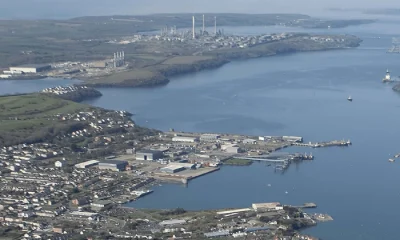Charity
Fishguard RNLI celebrates first female Coxswain in Wales, as charity marks 200th year
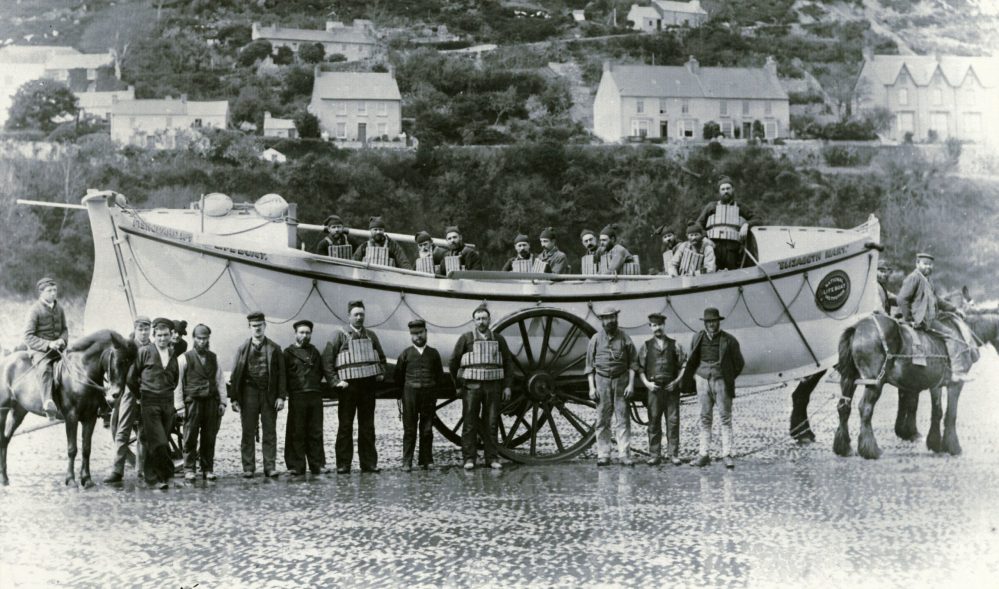
ON MONDAY, March 4, the Royal National Lifeboat Institution (RNLI) will celebrate 200 years of saving lives at sea. Fishguard RNLI Lifeboat Station is celebrating being both the oldest lifeboat station in Wales, as well as being the first Welsh station to have a female Coxswain.
On the day the charity turns 200, the RNLI is revealing its volunteer lifeboat crews and lifeguards in west Wales have saved an incredible 3,891 lives during its two centuries of lifesaving.
Since the charity was founded in 1824, its volunteer crews in west Wales have launched the lifeboats 14,872 times, saving 3,776 lives, while its lifeguards – who became part of the RNLI’s lifesaving service in 2001 – have responded to 8,865 incidents, saving 115 lives*. In total across the UK and Ireland, 146,452 lives have been saved by the RNLI – this equates to an average of two lives saved every day for 200 years.
Since 1824, the four lifeboat stations in Ceredigion have launched 4,848 times and saved 1,238 lives. In Pembrokeshire, the five stations have launched 8,563 times and saved 2,395 lives. Burry Port station in Carmarthenshire has launched 1,461 times and has saved 143 lives.
Fishguard Lifeboat Station on the far west coast of Pembrokeshire was the first lifeboat station to be established in Wales. Originally established in 1822, Fishguard’s first lifeboat was built by locals. In 1855, local inhabitants requested that the RNLI take over the station.
The station has also made RNLI history by being the first station in Wales to appoint a female Coxswain – Gemma Gill. Gemma has recently passed out as Coxswain and is thoroughly enjoying her new role.
Gemma joined the RNLI in 2001 serving as a volunteer for North Berwick and Aberystwyth RNLI before becoming a full-time staff member.
Gemma said: ‘The first person to take me to sea on a lifeboat was a woman called Rhona, and she told me “don’t let other people decide what you’re capable of,” which has always stuck with me.
‘While I believe it’s a matter of skills and experience rather than gender, I recognise the significance of this milestone.
‘We’ve come a long way from the image of a lifeboatman in his oilskins, and, as the first woman to become an RNLI coxswain in Wales, I hope to inspire other women and girls to join the lifeboat crew.’
Although not officially part of the early lifeboat crews, women have always played an active role in the work of the RNLI, from the ‘lady launchers’ who played key roles at lifeboat stations assisting in the launching and recovery of vessels, to fundraisers such as Marion Macara who helped to organise the first recorded charity street collection in Manchester in 1891.
Throughout its history, Fishguard lifeboat station has been awarded 28 medals. One gold, 18 silver and nine bronze. Today the station operates a D-class inshore lifeboat Edward Arthur Richardson as well as a Trent class Blue Peter VII.
While much has changed in 200 years, two things have remained the same – the charity’s dependence on volunteers, who give their time and commitment to save others, and the voluntary contributions from the public which have funded the service for the past two centuries.
Jo Partner, RNLI Head of Region for Wales says: ‘I am immensely grateful to everyone who is involved with the charity across Wales – our volunteers, supporters and staff. Today is a hugely significant day in our history and an occasion we should all be very proud of. I know there are lots of events being planned across Wales to mark this very special day and I hope people enjoy being part of this special piece of history.
‘I would like to take this opportunity to say thank you to all those who play a part in making the RNLI the proud organisation is it today – which really is a cause for celebration.’
RNLI Heritage Archive and Research Manager, Hayley Whiting, says: ‘The RNLI’s founder, Sir William Hillary, witnessed the treacherous nature of the sea first-hand when living on the Isle of Man and he wanted to take action. His first appeal to the nation in 1823 did not have the desired result but, thankfully, he persevered and gained the support of several philanthropic members of society, who put their names to the charity at a meeting in the City of London Tavern on 4 March 1824.
‘Twelve resolutions were passed at that meeting, the core of which still stand as part of the RNLI’s Charter 200 years later. This shows how the RNLI’s values and purpose have remained unwavering for 200 years, despite the social and economic changes and challenges of the past two centuries.
‘Hillary’s vision was ambitious and forward-thinking, and no doubt he would be extremely proud to see the charity he founded still going strong today, and to see how much it has achieved.’
The charity has a history of innovation, and adapting to challenging circumstances, such as:
Lifejackets: In 1861, Whitby lifeboat crew launched six times to rescue stricken vessels in a storm, but on their sixth launch a freak wave capsized the lifeboat and all but one of the crew were lost. The sole survivor was Henry Freeman, who survived because he was wearing a new design of cork lifejacket. After this event, the cork lifejacket became more widely adopted by lifeboat crews.
Fundraising: In 1886, 27 lifeboat crew members from Southport and St Annes lost their lives while trying to rescue the crew of the Mexico. A public appeal was launched, driven by local man Charles Macara. An 1891 appeal raised £10,000 in two weeks. On 1 October, Charles and his wife Marion organised the first Lifeboat Saturday. Bands, floats and lifeboats paraded through the streets of Manchester, followed by volunteers collecting money. More than £5,000 was taken on the day, which was the first recorded example of a charity street collection.
Lifeboats: In 1914, over 140 people were saved when the hospital steamship Rohilla was wrecked. The ship had been en route to Dunkirk to help wounded soldiers but was broken up when it ran aground on rocks near Whitby. Five lifeboats battled terrible seas to reach the ship. A motor lifeboat (the first of its kind) from Tynemouth, took the last 50 people on board. In total, 144 people were saved by the crews, who worked for over 50 hours in atrocious conditions. The motor lifeboat proved its capabilities and became more widely accepted by lifeboat crews after this event.
Wartime: When the First World War broke out, many lifeboat volunteers were called away to fight. The average age of lifeboat crews at home increased to over 50. During 1914-18, RNLI lifeboats launched 1,808 times, saving 5,332 lives. In 1939, young lifeboat volunteers were called away again to war. By the end of the Second World War, RNLI crews had saved 6,376 lives around the coasts of Britain and Ireland.
In 1940, 19 RNLI lifeboats were used to evacuate troops from Dunkirk. Two had RNLI crews onboard, while the others were crewed by the Royal Navy. The lifeboats and their stand-in crews saved thousands of lives while being shelled and bombed for days.
Throughout its bicentenary year, the charity is running events and activities to remember its important history and celebrate the modern lifesaving service it is today, while hoping to inspire generations of future lifesavers and supporters.
A Service of Thanksgiving to mark 200 years of the RNLI will take place at Westminster Abbey on 4 March 2024 at 11.30am. It will be attended by representatives from RNLI lifesaving communities around the UK and Ireland.
For further information about the RNLI’s 200th anniversary, visit RNLI.org/200.
*Statistics from RNLI Operational Data from 4 March 1824 to 31 December 2023 inclusive. A life saved shows how many of the people helped by the RNLI would have lost their life had the RNLI not been there.
Charity
Angle RNLI launch to stricken yacht in 42-knot gale as skipper swept overboard
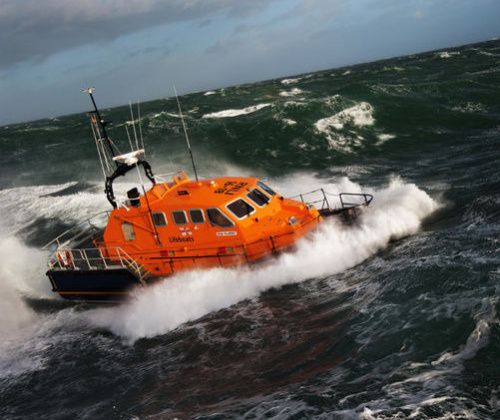
Lifeboat crew battle six-metre seas after lone sailor loses engine, sail and takes on water west of Skokholm
ANGLE RNLI lifeboat volunteers carried out a dramatic rescue after responding to a broken Pan Pan call from a 28ft yacht in severe conditions, with winds gusting to 42 knots and waves reaching up to six metres.
At 10:56am on Tuesday (Feb 3), the crew were already afloat on a navigation pass-out exercise in Dale Roads when they overheard the distress transmission from a yacht west of Skokholm Island. Moments later, HM Coastguard tasked the lifeboat to respond while further information was gathered.
While making best speed to the scene, the crew were told the yacht, carrying one person, had suffered engine failure, blown out its sail and was taking on water from an unknown source.
The casualty vessel was located around three miles west of the island. After assessing the situation, the crew decided conditions were too dangerous to place a lifeboat volunteer aboard, and the safest option was to establish a tow.
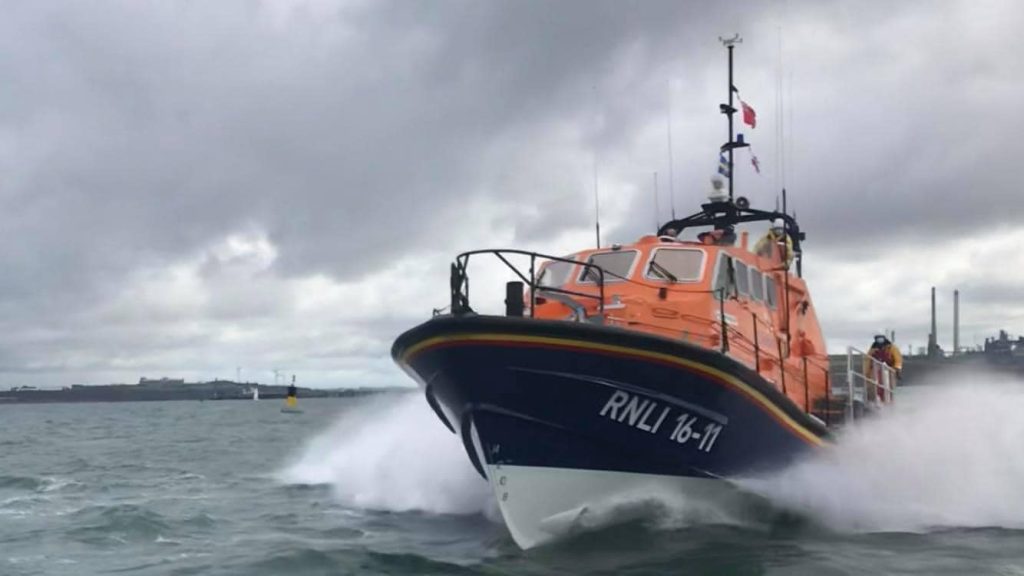
With a south-easterly gale and a very rough sea state, the tow was rigged and the yacht began a slow passage towards Milford Haven.
However, shortly after the tow commenced, a large wave threw the skipper overboard. Although tethered to the yacht by his safety harness, he was dragged alongside the vessel in the heavy swell.
The lifeboat crew immediately released the tow and began recovery operations. With the towline fouling access on one side and the casualty trapped on the other, a crew member was eventually placed aboard the yacht over its bow. The skipper’s harness was cut, allowing him to drift clear, before he was safely recovered from the water by the lifeboat.
With the priority now the sailor’s welfare, and the risks of re-establishing the tow judged too great, the crew member was brought back aboard and the lifeboat returned to harbour.
On arrival, volunteers from the Dale Coastguard Rescue Team assisted with casualty care and gathered the necessary details.
The lifeboat was stood down and made ready for further service by 2:30pm.
The station also thanked the The Lord Nelson Hotel for accommodating the sailor at short notice.
The rescue has drawn heartfelt thanks for the volunteer lifeboat crew, whose quick actions brought the man safely back to shore. The gesture from the Lord Nelson Hotel, offering shelter for the night, also reflects the community spirit that so often accompanies the work of Pembrokeshire’s RNLI teams.
A spokesperson for Angle RNLI said the incident highlighted both the speed at which conditions can deteriorate at sea and the importance of safety equipment such as harnesses and tethers.
Charity
Age Cymru urges action on hidden crisis facing older people ahead of Senedd election
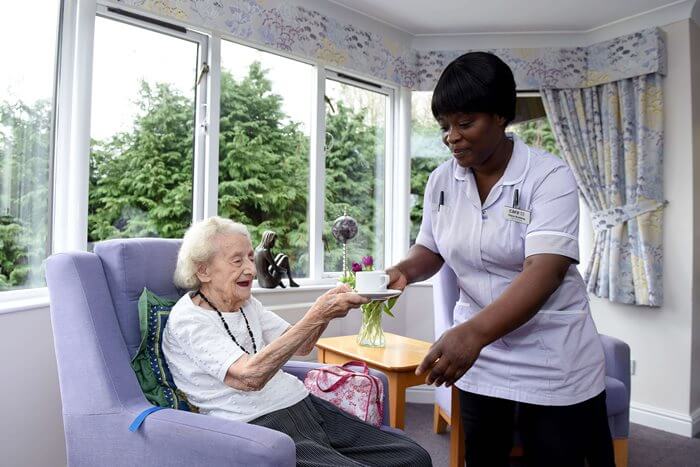
Charity warns one in three over-50s struggling with costs, healthcare delays and digital exclusion
AGE CYMRU has launched a manifesto calling on political parties to tackle what it describes as “the crisis people don’t see” facing older people across Wales ahead of the Senedd elections in May.
The national charity for older people says rising living costs, pressure on NHS and care services, poor transport links and digital exclusion are leaving many pensioners struggling day-to-day and feeling increasingly isolated.
By 2030, more than 1.3 million people in Wales will be aged over fifty – around forty per cent of the population.

But despite making up a growing share of the country, the charity says too many older people are being “pushed to the margins”.
Age Cymru’s annual survey found nearly half (46%) of older people struggled with the cost of living in the past year, with sixty-two per cent cutting back on essentials such as heating and food.
Access to healthcare is also deteriorating. Half of respondents said they had difficulty securing GP appointments, with waits of four weeks or more now common. More than half of those seeking social care described the process as difficult or very difficult.
Digital exclusion is another growing concern. Thirty-one per cent of people aged over seventy-five in Wales have no internet access at home – roughly double the UK average – meaning many cannot easily access services that have moved online.
Manifesto demands
The charity is calling on the next Welsh Government to deliver seven key changes:
• Easier access to health services
• Timely, quality social care
• Action on pensioner poverty
• Reliable public transport
• Stronger community connections and Equality Act compliance
• Offline access to services for those without digital skills
• Support to keep homes warm
Real lives affected
For Terry Lemington, 72, from South Wales, the problems are personal.
While caring for his late wife, he said he was unaware of support he could have received until just ten weeks before she died.
“It wasn’t until ten weeks before my wife passed away that I was told I could have had additional support to help me care for her,” he said.
“That included a stairlift, which in the end was due to be fitted on the day she passed away. I just wasn’t aware of the support that was available.”
Terry, who does not drive, says limited bus services leave him cut off.
“There are hourly buses to larger towns and a small village bus, but they finish at mid-day on Saturday and there is nothing on Sunday. I’m completely cut off,” he added.
“Right now it feels like older people are pushed to the margins. But we still have so much to contribute.”
Economic impact
Victoria Lloyd, Chief Executive of Age Cymru, said the issue was not only moral but economic.
“These stories are sadly all too common,” she said.
“Older people contribute around £2 billion a year to the Welsh economy, whether through paid work, childcare for families or volunteering.
“Investing in the health and wellbeing of older people is an investment in Wales as a whole.”
She added that while the Welsh Government’s Age Friendly Wales strategy had made progress, more decisive action was needed.
“We’re calling on all parties seeking votes this year to read our manifesto and ensure older people are properly considered in their policies and promises.”
Charity
Vincent Davies raises £13,682 for air ambulance charity

Independent Haverfordwest store backs lifesaving crews with year of community fundraising
A WEST WALES department store has raised more than thirteen thousand pounds for a lifesaving emergency service after a packed year of community fundraising.
Staff at Vincent Davies Department Store collected £13,682 for the Wales Air Ambulance Charity, after voting the organisation their Charity of the Year for 2025.
The independent retailer organised events throughout the year, including an Easter bingo, bake sales, quizzes, raffles, staff sales, Christmas jumper days and a festive wreath-making workshop. Charity jam jars placed in Café Vincent also helped gather steady donations from customers.
One of the most popular attractions was the store’s charity singing penguin trio, which drew smiles from shoppers of all ages and boosted collections.
Sarah John, Joint Managing Director at Vincent Davies, said: “Raising £13,682 for the Wales Air Ambulance Charity is something we are extremely proud of at Vincent Davies Department Store. As a director, it’s wonderful to see our community come together to support a charity that makes such a lifesaving difference.”
The air ambulance is consultant-led, delivering hospital-level treatment directly at the scene of serious incidents and, when needed, transferring patients straight to the most appropriate specialist hospital.
Working in partnership with the NHS through the Emergency Medical Retrieval and Transfer Service, crews can provide advanced critical care including anaesthesia, blood transfusions and even minor surgical procedures before reaching hospital.
Operating across the whole of Wales, its teams travel the length and breadth of the country by helicopter and rapid response vehicle to reach patients quickly in both rural and urban areas.
This is not the first time the Haverfordwest store has backed the cause. In 2016, staff previously raised £5,831 when the charity was also chosen as their beneficiary.
Mike May, the charity’s West Wales Regional Fundraising Manager, said: “We are so grateful to Vincent Davies Department Store for raising an incredible amount for our charity. Throughout the year they put on a variety of different events and what a successful fundraising year it was.
“The charity needs to raise £13 million every year to keep our helicopters in the air and our rapid response vehicles on the road. By raising £13,682, the staff and customers have played an important part in saving lives across Wales.”
The store says it will announce its Charity of the Year for 2026 in the coming weeks.
-

 Crime1 day ago
Crime1 day agoSex offender jailed after living off grid in Pembrokeshire and refusing to register
-

 News2 days ago
News2 days agoPrincess of Wales visits historic Pembrokeshire woollen mill
-

 Crime6 days ago
Crime6 days agoPembroke man accused of child sex offences sent to Swansea Crown Court
-

 Health4 days ago
Health4 days agoDoctor struck off after sexual misconduct findings at Withybush Hospital
-

 Crime7 hours ago
Crime7 hours agoTeacher injured and teenager arrested for attempted murder at Milford Haven School
-

 Community6 days ago
Community6 days ago50s women threaten legal action over pension compensation refusal
-

 Education5 days ago
Education5 days agoIndustry insight helps marine cadets chart career course
-

 Crime6 days ago
Crime6 days agoManhunt intensifies after woman seriously injured in Carmarthen park stabbing











